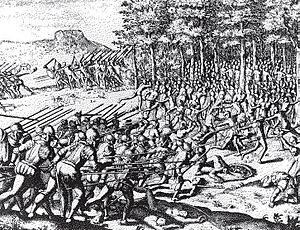Battle of Andalien facts for kids
Quick facts for kids Battle of Andalien |
|||||||
|---|---|---|---|---|---|---|---|
| Part of Arauco War | |||||||
 Battle of Andalien |
|||||||
|
|||||||
| Belligerents | |||||||
| Commanders and leaders | |||||||
| Strength | |||||||
|
200 Spanish soldiers:
Many natives
|
5,000–20,000 warriors | ||||||
| Casualties and losses | |||||||
| 1 Spaniard killed over 100 wounded many Yanaconas dead and wounded 60 horses wounded |
3,000 Mapuche | ||||||
The Battle of Andalien was an important fight that happened in early February 1550. It was a night battle between the Mapuche people, led by their chief, called a Toqui, named Ainavillo, and the Spanish army. The Spanish forces were commanded by Pedro de Valdivia. His army included 200 Spanish soldiers and cavalry, along with many native allies known as yanakuna. Among these allies were 300 Mapochoes warriors, led by Michimalonco.
The Battle Begins
After Pedro de Valdivia reached the Biobío River on January 24, 1550, his army started exploring the river valleys. They had several small fights with groups of Mapuche warriors. After about ten days, Valdivia moved his army towards the sea. They set up camp on a flat area between the Bio-Bio and Andalién River, with a lake protecting one side of their camp.
They stayed there for two days and nights. On the second night, the Mapuche chief Toqui Ainavillo led a large force of 20,000 warriors. They came out of the nearby forests in three groups. The Mapuche hoped that attacking at night would make the Spanish horsemen less effective and perhaps scare their horses. They also wanted to surprise the Spanish.
A Night Attack
However, the Spanish were ready. Valdivia made sure that half of his soldiers were always on watch during the night. The other half were ready to wake up and fight at any moment. Because of the lake, the Mapuche had to approach the Spanish camp from only one side. This forced them to gather closely together, forming a very dense column of warriors.
The night attack turned into a fierce battle that lasted for three hours. Valdivia found it hard to break the strong Mapuche formation with his cavalry charges. Many of his horses were wounded during the fighting. Valdivia then ordered his cavalry to get off their horses and fight on foot alongside the other soldiers.
Spanish Victory
The Spanish soldiers wore armor and used swords and shields. They also had arquebuses, which were early types of guns. The Mapochoes, who were allied with the Spanish, used arrows. These weapons helped them kill about three hundred Mapuche warriors and wound many more. The Mapuche warriors behind pushed forward, creating piles of bodies in front of the Spanish line.
Finally, the Mapuche warriors started to get tired. Their lines became thinner and disorganized, and their archers ran out of arrows. Seeing this, the Spanish launched a counterattack just as dawn was breaking. This broke the Mapuche formation completely. Valdivia then sent Michimalonco and his 300 Mapochoes to chase after the retreating Mapuche into the forests. Many more Mapuche were killed during this chase.
According to historical records, a total of 3,000 Mapuche were killed in the battle and the pursuit. The Spanish suffered only one death, which was due to friendly fire (meaning a Spanish soldier was accidentally killed by another Spanish soldier). However, many Spanish soldiers were wounded, as were many of their horses. After a day spent treating the wounded, the Spanish army continued their journey. They were heading to Penco on the Bay of Concepción to meet up with ships led by Juan Bautista Pastene.
See also
 In Spanish: Batalla de Andalién para niños
In Spanish: Batalla de Andalién para niños
 | Georgia Louise Harris Brown |
 | Julian Abele |
 | Norma Merrick Sklarek |
 | William Sidney Pittman |

